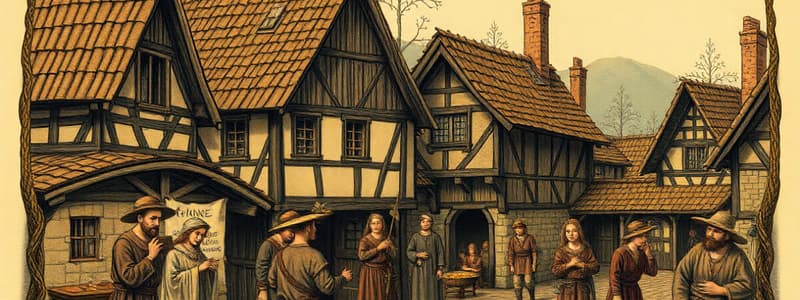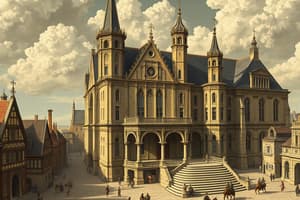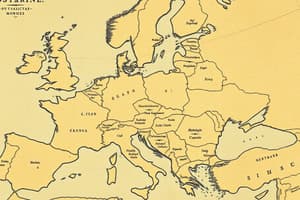Podcast
Questions and Answers
What role did the village church play in the community?
What role did the village church play in the community?
- It acted as a marketplace for trading goods.
- It served as the center for all religious and most social activities. (correct)
- It provided education exclusively to the peasants.
- It was solely for religious ceremonies.
What was the staple item in the peasant diet?
What was the staple item in the peasant diet?
- Fruits
- Cheese
- Meat
- Bread (correct)
During festival days, what activity was commonly held in the village churchyard?
During festival days, what activity was commonly held in the village churchyard?
- Agricultural fairs
- Religious sermons
- Trade markets
- Dancing and drinking (correct)
What distinguished ale from beer in peasant beverages?
What distinguished ale from beer in peasant beverages?
What was a significant factor contributing to the revival of trade in medieval Europe?
What was a significant factor contributing to the revival of trade in medieval Europe?
Which of the following was NOT mentioned as a beverage consumed by peasants?
Which of the following was NOT mentioned as a beverage consumed by peasants?
What agricultural advancement did Europeans learn about through trade during the Crusades?
What agricultural advancement did Europeans learn about through trade during the Crusades?
Which city was known as a center for the wool industry in Northern France?
Which city was known as a center for the wool industry in Northern France?
What was Aristotle's view of God?
What was Aristotle's view of God?
What power does the pope have regarding bishops?
What power does the pope have regarding bishops?
Which work is best known for reconciling Aristotle's teachings with those of the Church?
Which work is best known for reconciling Aristotle's teachings with those of the Church?
What practice emerged as lords sold church offices for income?
What practice emerged as lords sold church offices for income?
What does St. Thomas Aquinas consider to be 'Scientific Truth'?
What does St. Thomas Aquinas consider to be 'Scientific Truth'?
According to Pope Innocent III, how does he view the relationship between the monarchy and priesthood?
According to Pope Innocent III, how does he view the relationship between the monarchy and priesthood?
Which language was the universal language of medieval civilization?
Which language was the universal language of medieval civilization?
What was the most popular form of vernacular literature in the 12th century?
What was the most popular form of vernacular literature in the 12th century?
What does the church do when it excommunicates an individual?
What does the church do when it excommunicates an individual?
What role did the Church play in political affairs during the Middle Ages?
What role did the Church play in political affairs during the Middle Ages?
What type of poetry is the Chanson de Geste?
What type of poetry is the Chanson de Geste?
What architectural style replaced the flat wooden roof in medieval buildings?
What architectural style replaced the flat wooden roof in medieval buildings?
What happens when a country is placed under an interdict by the Church?
What happens when a country is placed under an interdict by the Church?
What was the primary focus of troubadours in their poetry?
What was the primary focus of troubadours in their poetry?
Who typically headed the special court for trying heretics during the Inquisition?
Who typically headed the special court for trying heretics during the Inquisition?
What was a common consequence for those accused of heresy who did not confess?
What was a common consequence for those accused of heresy who did not confess?
What economic system developed as a result of increased trade and the demand for money?
What economic system developed as a result of increased trade and the demand for money?
What term refers to the residents of medieval cities, derived from a German word meaning walled enclosure?
What term refers to the residents of medieval cities, derived from a German word meaning walled enclosure?
Which of the following factors contributed to the revitalization of old Roman cities?
Which of the following factors contributed to the revitalization of old Roman cities?
What was a common reason for city residents to seek independence from lords?
What was a common reason for city residents to seek independence from lords?
How did medieval cities typically manage their own affairs?
How did medieval cities typically manage their own affairs?
What was a major public health issue faced by medieval cities?
What was a major public health issue faced by medieval cities?
What was a constant danger in the crowded conditions of medieval cities?
What was a constant danger in the crowded conditions of medieval cities?
Which aspect of medieval cities contributed to poor living conditions?
Which aspect of medieval cities contributed to poor living conditions?
What was the main argument made by John Wycliffe regarding salvation?
What was the main argument made by John Wycliffe regarding salvation?
What event led to Jan Hus being condemned to be burned as a heretic?
What event led to Jan Hus being condemned to be burned as a heretic?
Which weapon was predominantly used by English forces during the Hundred Years War?
Which weapon was predominantly used by English forces during the Hundred Years War?
What was a key factor leading to the start of the Hundred Years War?
What was a key factor leading to the start of the Hundred Years War?
Who was Joan of Arc and what was her role during the Hundred Years War?
Who was Joan of Arc and what was her role during the Hundred Years War?
Which battle is noted for the English victory due to their use of bowmen?
Which battle is noted for the English victory due to their use of bowmen?
What technological advancement aided the French in winning the Hundred Years War?
What technological advancement aided the French in winning the Hundred Years War?
What was the fate of Joan of Arc after being captured by the English?
What was the fate of Joan of Arc after being captured by the English?
Flashcards are hidden until you start studying
Study Notes
Feast Days and Village Life
- Feast days were opportunities for dancing, drinking, and informal sports.
- Village church was the center of religious and social life.
- Village priests taught peasants basic Christian beliefs, but many priests had limited education.
- Churchyards were used for dancing and drinking, despite the priest's disapproval.
Peasant Diet
- Staple of peasant diet was bread made from various grains, including wheat, rye, barley, millet, and oats.
- Black bread was dark due to the mix of grains.
- Peasants also ate cheese, nuts, berries, fruits, and eggs.
- Meat was a rare delicacy.
Peasant Beverage
- Clean water was scarce, so peasants drank brewed and fermented beverages for sanitation.
- Ale made from grain, water, and fermented with yeast was common.
- Beer differed from ale by the addition of hops.
- Upper class drank wine fermented from grapes.
Revival of Trade
- Medieval Europe was primarily agrarian, but experienced a growth in towns and cities during the 11th and 12th centuries.
- Increase in agricultural output enabled the development of trade.
- By the 10th century, skilled individuals emerged with products for trade.
- Diminishing invasions during this time fostered stability and further promoted trade.
- Old Roman cities reemerged as trade centers, and new trading centers also emerged.
- Venice in Northern Italy was a center with ties to the Byzantine Empire and the Middle East.
- Flanders in Northern France was known for its wool industry.
- Trade brought cultural exchange, introducing Middle Eastern goods to European markets. Europeans also learned about oranges, sugar, rice, irrigation, papermaking, and the compass.
Trade Fairs
- Trade fairs were large markets where merchants exchanged goods.
- The rise of trade prompted a demand for gold and silver over bartered goods.
- This led to a money economy based on the exchange of coins.
- Increased trade spurred the growth of commercial capitalism, where people invested in trade and goods for profit.
Growth of Cities
- Merchants settled in old Roman cities, joined by craftspeople and artisans.
- This influx of people revitalized these old cities.
- New cities were also founded by these groups.
- Merchants built near castles or trade routes where lords offered protection.
- Walls were built around cities to offer protection as they flourished.
Bourgeoisie
- Residents of medieval cities were called burghers or bourgeoisie, from the German word "burg" meaning a walled enclosure.
Medieval Cities
- Medieval cities were smaller than ancient cities, limited by surrounding walls.
- Medieval London had a population of around 40,000.
- Residents aimed to gain independence from manor lords to control their finances and trade.
- Townspeople bought or earned rights from lords.
- Cities could obtain a charter, or "charter of freedoms," from their local lord, allowing them to self-govern.
City Government
- Medieval cities developed their own governmental systems.
- City councils served as judges, city officials, and lawmakers.
- The Patrician, or upper, class often dominated city politics.
Daily Life in Medieval Cities
- Walls made space a premium, leading to closely spaced buildings and narrow, winding streets.
- Cities were often dirty and smelled of animal and human waste.
- Coal and wood fires caused air pollution, and tanning and animal-slaughtering industries polluted water with blood, tannic acids, animal fat, hair, and other waste.
- Waste was often dumped in rivers, so well water was the only source of clean water.
Dangers of Medieval Cities
- Overcrowding made fire a constant threat.
Papal States and Simony
- Papal States were territories controlled by the Pope and the Church, surrounding Rome.
- Increasing Church involvement in politics during the Middle Ages complicated matters.
- Lords appointed bishops and other church officials as their vassals, creating loyalty conflicts.
- Bishops and abbots became worldly and neglected spiritual duties.
- Simony developed where lords sold church offices for income.
The Church Supreme
- The Pope's authority was asserted through the Act of Papal Supremacy declared by Pope Innocent III.
- The Pope was considered "lower than God but higher than man...Judges all and is judged by no one."
- The Pope believed he had power over the souls of people, while kings held power over their earthly bodies.
- No king was believed to rule rightly without serving Christ's vicar.
"Weapons" of the Church
- The Church claimed to hold the power of salvation through the sacraments.
- The church could manipulate people and leaders by controlling these sacraments.
- Excommunication cut someone off from receiving sacraments.
- Interdicts placed over countries prevented entire regions from receiving sacraments.
The Inquisition
- The Church appointed a special court, usually headed by Dominicans, to find and try heretics.
- Accused heretics confessing were forced to publicly repent.
- Those who refused to confess voluntarily were tortured until they did.
- Those refusing to confess but still deemed guilty were handed over to the state for execution.
- Relapsed heretics were also subject to execution.
St. Thomas Aquinas
- Aquinas sought to reconcile Aristotle's teachings with Church teachings.
- His most famous work is Summa Theologica.
Teachings Of Thomas Aquinas
- Aquinas believed in two types of truth - religious and scientific.
- Religious truth was revealed by faith and not provable by science.
- Scientific truth could be proven via science.
- He believed that faith did not need evidence to be valid due to its divine origin.
- He also believed knowledge was not detrimental to faith, as it did not corrupt faith.
- Both faith and reason originated from God and supported each other.
Vernacular Literature
- Latin was the universal language of medieval civilization.
- It was used in churches and universities.
- Vernacular was the language of common people, including Spanish, French, English, and German.
- People began to produce literature in their own languages.
- Troubadour poetry, mostly love stories about court life, was popular in the 12th century.
Troubadours
- Troubadours were traveling poets and musicians who shared stories of courtly love between knights and ladies.
Chanson de Geste
- Chanson de Geste was heroic epic poetry.
- The Song of Roland, written in French, tells the story of a battle between a Muslim army and Charlemagne.
Medieval Architecture
- The 11th and 12th centuries saw a boom in architecture and building.
- Buildings were initially built in a Basilica style, featuring a rectangular structure with a flat wooden roof.
- Romanesque architecture replaced the flat roof with rounded arches.
English Reforms: John Wycliffe
- John Wycliffe argued that salvation came from faith, not the Church.
- He and his followers translated parts of the Bible into English.
- Wycliffe's reforms laid a foundation for later change but failed to achieve immediate success.
Jan Hus
- Jan Hus, a Czech reformer, was likely influenced by Wycliffe's teachings.
- Hus advocated for church reform and spoke against corrupt practices.
- He was invited to the Council of Constance with promises of safety but was burned as a heretic.
The Hundred Years War
- This war was a conflict between England and France.
- Contributing factors included:
- English claims to land in France.
- Competition between England and France for Flanders.
- Edward's claim to the French throne, which angered the French.
- Both sides saw war as an opportunity to advance their agendas.
- King Philip VI of France seized English-held territories, leading to Edward III declaring war on France.
- This war lasted 116 years and significantly changed both countries.
France vs. England
- France and England had different fighting styles.
- The French used the crossbow.
- The English favored the longbow.
- At the Battle of Crecy, English archers defeated the French, resulting in a decisive English victory.
- King Henry V of England executed French prisoners after this battle.
- The English triumphed again at Agincourt when French cavalry became stuck in mud.
Jeanne d'Arc (Joan of Arc)
- Charles was the uncrowned king of France, known as the dauphin.
- Joan of Arc, a young peasant girl, claimed to have heard voices instructing her to save France.
- In 1429, she reached Charles' court and convinced him to let her lead his army in battle.
Orleans
- Joan led French troops to victory at the Battle of Orleans.
- Joan was captured by the English in 1430 and burned as a heretic.
- Her martyrdom made her a symbol for the French cause.
Gunpowder
- The French ultimately won the war due to the development of gunpowder.
- The French created cannons, enabling them to defeat the English.
- France achieved victory in 1453.
Studying That Suits You
Use AI to generate personalized quizzes and flashcards to suit your learning preferences.




